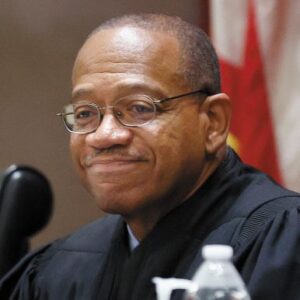
Bernard Goodwyn, Chief Justice, Virginia Supreme Court. Photo credit: Richmond Times-Dispatch
By Dick Hall-Sizemore
The Commonwealth is unique in the nation in how it selects its judges.
States use a wide variety of methods to select judges. Furthermore, many states use different methods to select judges at different levels. The National Center for State Courts, located in Williamsburg, by the way, has created a nice report showing how judges are selected in each state.
Virginia is simple and consistent: all judges are selected by the legislature. It is the only state in which the legislature selects judges.
For the sake of simplicity, I am limiting this discussion to state supreme courts. In many states, the judges of the highest court are elected. Some elections are partisan; others are nonpartisan. The other method commonly used is appointment by the governor from a list recommended by a judicial nomination commission with approval of the legislature required in some states. Judges so appointed usually have to run for retention when their terms are up.
For anyone who objects to the Virginia method and pines for the “democratic” approach of popular election, consider the spectacle that recently occurred in Wisconsin. There was an election to fill a vacancy on the state supreme court. The consensus was the membership of the court was evenly divided between “conservatives” and “liberals.”
Technically, the election is nonpartisan, but there was no question which candidates were being backed by which parties. Janet Protasiewicz, who won by 11 points, was heavily backed by the Democrats. Her opponent, Daniel Kelly, a former Supreme Court justice, was backed by the Republicans. The two candidates spent more than $40 million, a record for a judicial election in the United States. The Democratic Party contributed $9 million to Protasiewicz and GOP megadonor Richard Uihlein spent nearly $6 million to help Kelly.
The main issue in the election was abortion. An 1849 Wisconsin law bans abortion unless one is required to save the life of the mother. That law is being challenged in court and the case is expected to make it to the state supreme court. Protasiewicz made no bones about where she stands: “I believe in a woman’s right to choose.” Furthermore, during the campaign, she promised, “I can tell you with certainty that if I’m elected on April 4th, I’m sure that we will be looking — I am sure we will be looking — at that 1849 law.”
The race was followed closely nationally and the results made headlines in most of the national media.
Another major issue was the gerrymandered state legislature. During the campaign, Protasiewicz called the election maps “rigged.”
This is how The Washington Post described the scene on election night:
“At Protasiewicz’s victory party in downtown Milwaukee, the three liberals who sit on the court marched into the hotel ballroom arm in arm to Lizzo’s ‘About Damn Time.’ They later joined Protasiewicz onstage, and the four of them — the court’s incoming majority — held their hands aloft as the crowd chanted ‘Janet!’”
Is this how we want to select judges in Virginia—a candidate declaring how she would rule on major cases and a victory celebration worthy of a governor? Maybe I am just old fashioned, but I believe that judges should conduct themselves with dignity and demonstrate at least a semblance of impartiality.
If one is not convinced of the dangers of popular election of judges, I refer you to our next door neighbor, West Virginia. About 20 years ago, a coal baron bought himself a supreme court justice in an election and the justice later ruled in his favor in a major fraud case.
The Virginia system works well. There is no question that politics are involved, but that is inevitable in whatever system is used. The fact that the ranks of circuit court and district court judges always include a few former members of the General Assembly may be a bit unseemly, but the practice is not pervasive and those selected, for the most part, have accorded themselves well. There may be grumbling that a specific judge is too lenient or that another is overly harsh, but Virginia’s judges enjoy a reputation for competence, fairness, and honesty.
Recently, the Virginia State Supreme Court proved that it was not driven by political bias. One reason that House Democrats argued against adopting a constitutional amendment establishing a redistricting commission was that the proposal gave the Supreme Court the authority to adopt a redistricting map if the commission was deadlocked. The Democrats voiced the fear that the Supreme Court, comprised mostly of justices elected by past Republican legislatures, would adopt a plan that favored Republicans. The commission did deadlock and the plan that the Supreme Court adopted was widely considered fair and nonpartisan.
Virginians should be pleased with their judicial system.


